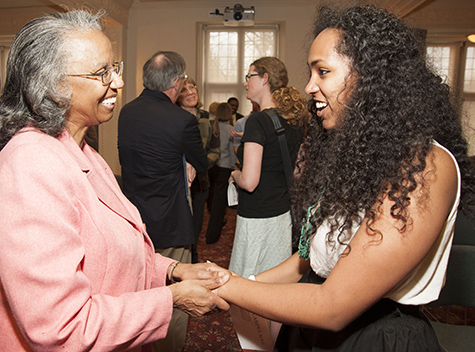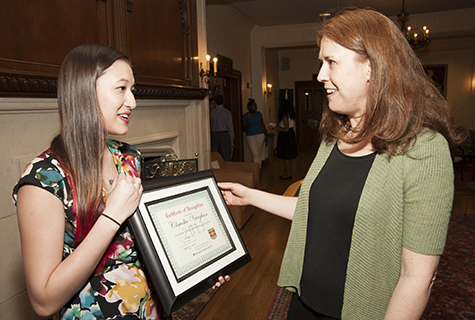The first Dean James E. McLeod Freshman Writing Prize has been awarded, and the inaugural winners are Senit Kidane and Claudia Vaughan.
McLeod was a longtime leader at Washington University in St. Louis, serving as vice chancellor for students and dean of the College of Arts & Sciences, the university’s largest undergraduate program, when he died in 2011 after a two-year battle with cancer.
The Center for the Humanities provided funding for the contest in McLeod’s honor, and any freshman in the College of Arts & Sciences could submit work for consideration. Original research papers exploring an aspect of race, gender or identity and created for a freshman course were eligible.

Freshman Writing Prize. The Center for the Humanities and the College of Arts & Sciences held a ceremony April 9, during which leaders announced the first winners of the writing prize. (Credit: Kevin Lowder)
The winning entries were:
1) “Not Your Ordinary Schoolyard Hustle: Black Women in the Underground Economies of the 1920s,” by Kidane, for her class “African-American Women’s History: Sexuality, Violence and the Love of Hip-Hop.” The paper explores black women’s roles in the aftermath of World War I and their involvement in the complex illegal economies of the time, being active, and sometimes leaders, in prostitution and bootlegging operations, for example. Kidane is majoring in anthropology and in African and African-American studies.

Erin McGlothlin, PhD, interim director of the Center for the Humanities and associate professor of German. (Credit: Kevin Lowder)
2) “Call Me You Need Me,” by Vaughan, a film and media studies major, for her Writing 1 class. The paper is a memoir of Vaughan’s Chinese immigrant grandfather’s journey to and experience in the United States.
Sowande’ Mustakeem, PhD, assistant professor in history and in the African and African-American Studies program, both in Arts & Sciences, created the writing contest. The center provides prize money and the College of Arts & Sciences offers administrative support, an example of the creative initiatives that are possible when faculty and administrators work in collaboration to support students.
Mustakeem, academic coordinator of the writing prize, said she had planned to approach McLeod about creating a writing contest exclusively for freshmen because in other competitions on campus, their work often was compared to juniors and seniors more versed in the research and writing process. After McLeod died, it became a logical way to honor his life and his concern for students and the value of an education, she said.
“It’s helping to extend Dean McLeod’s legacy,” she said. “This is an opportunity for freshmen to see themselves as scholars in the making.”
A committee reviewed and narrowed the entries — 23 in all were submitted in the contest’s first year — and selected finalists for the inaugural awards. The two winners learned of their success at a ceremony in the Women’s Building Formal Lounge April 9. They received $250, a framed certificate and the opportunity to have their work published through the Center for the Humanities.
Upon McLeod’s death, Chancellor Mark S. Wrighton remembered the man as one of WUSTL’s “greatest citizens and leaders.” McLeod first joined the university in 1974 as an assistant professor of German and held several administrative positions throughout the years.
Provost Edward S. Macias, PhD, and several others made remarks at the writing prize ceremony.
The long-term goal of the writing prize is to encourage students to begin conducting research early in their undergraduate careers. It likewise will help faculty identify and nurture incoming students who show the potential to become strong researchers in the humanities and social sciences.
“It’s so exciting. Dean McLeod would be proud,” Mustakeem said. “Here’s an opportunity to say to students, ‘You matter. And look how you’re contributing to intellectual knowledge.’”